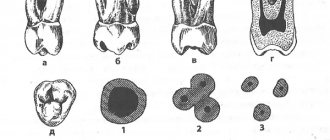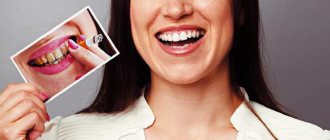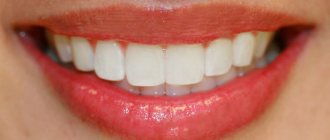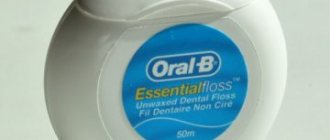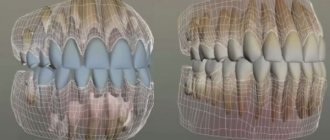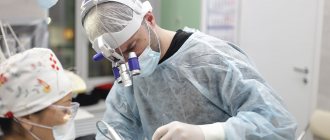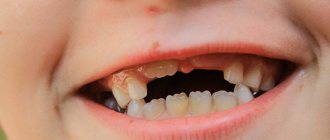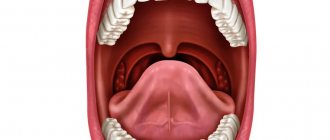Oral care is an important rule for every person. Caries, increased sensitivity of teeth, bad breath. These are the consequences of non-compliance with personal hygiene rules and improper oral care. Teeth brushing is necessary at any age. This procedure helps remove plaque, destroys pathogenic microflora and prevents the development of diseases associated with teeth and gums. But you need to brush your teeth correctly, otherwise you won’t achieve the expected effect.
Professional care
At an appointment with a specialist, teeth are cleaned with ultrasound.
A special device will remove plaque from the enamel and formed stones at the base of the teeth and under the gums. This procedure is virtually painless. You can't do this yourself. Stones and plaque appear after drinking tea, coffee, and cigarettes. The doctor will check the oral cavity for diseases (periodontal disease) and damage to the enamel (caries). If necessary, he will select the correct treatment and recommend proper dental care.
To strengthen tooth enamel, a specialist can perform fluoridation. It can be ordinary and deep, when special preparations are placed at the base of the tooth, which quickly restores the enamel.
Teeth whitening is carried out using the Air Flow system. It allows you to restore the natural color of your teeth and destroys bacteria. A special sandblasting machine is used, inside of which there is a special solution and an abrasive mixture. With its help, plaque is removed and tooth enamel is polished.
List of necessary daily caring actions
The choice of complex and frequency of hygiene procedures depends on the condition of the seriously ill patient. It is very important to understand what actions the patient is able to perform independently, so as not to lose the skills that are still available. Every morning, the caregiver should:
- wake up the patient;
- help relieve natural need;
- wash the genitals, change the diaper if necessary;
- carry out hygiene procedures - toilet the eyes, nose, mouth, ears;
- wipe the armpits, areas under the breasts in women;
- comb hair;
- straighten the bed, pajamas;
- prevent bedsores;
- measure physiological indicators;
- feed the patient;
- help take medications;
- follow the doctor’s individual recommendations.
Careful hygienic care ensures the comfort and well-being of a bedridden patient.
In contact with
Personal hygiene
Represents daily oral care using special products:
- special brush;
- toothpaste or powder;
- floss;
- conditioner balms.
The main method of hygiene is the daily removal of food debris that harms the enamel and tooth tissue. The mucous membrane is well supplied with blood and serves as a site of colonization and infection by bacteria. If you do not pay enough attention to hygiene, active reproduction of pathogenic flora will begin.
Rules for choosing toothpaste
If the brush cleans all dirt mechanically, then the functions of toothpaste are much broader. Many people prefer universal options, which, according to the manufacturer, do everything at once; clean, whiten, freshen breath, treat and prevent various diseases. As a rule, such pastes are not medicinal and actually partially solve all of the above problems. Universal toothpastes are safe and suitable for people without serious dental problems.
General hygiene rules
There are simple rules for caring for your teeth and oral cavity. They must be taught from early childhood. The best thing is the example of adults. Forming such a habit is a very important step in creating a “Hollywood smile” in the future. To do this you need:
- Brush your teeth thoroughly every morning. The second time must be before bedtime;
- after snacks, clean with a special thread (floss);
- use fluoride-containing pastes;
- visit the dentist 2 times a year.
Proper nutrition is also important to keep your mouth healthy. A lack of fluoride can lead to premature destruction of tooth enamel. Products containing many chemical fillers (chips, crackers, carbonated sweet water) negatively affect the appearance of teeth and lead to darkening.
How often should you brush your teeth?
It is believed that you need to brush your teeth at least twice a day. There is a very practical justification for this. Brushing in the morning removes bacteria that have accumulated in the mouth overnight. Cleaning in the evening before bed helps remove bacterial plaque that has accumulated during the day and inhibits the formation of biofilm at night.
Another widely known tip is to brush your teeth for at least 2 minutes. One jaw consists of three conventional parts: chewing teeth on the right and left, and the front part. It is necessary to pay sufficient attention to each department.
Cleaning accessories
Everyone should have their own toothbrush. How to choose a toothbrush? What are they? When coming to a store, customers often choose products that they like better in appearance. There are many types of toothbrushes; everyone should choose one for themselves according to the recommendations.
Types of brushes
- Mechanical is the most popular and inexpensive.
- Electric is more expensive. Less effort is needed to cleanse.
In addition, you need to pay attention to the stubble. It comes in different hardnesses. You need to make the right choice:
- very soft, suitable for children and adults with sensitive enamel;
- soft – for adults with bleeding gums;
- medium – the most popular and is suitable for children over 12 years old and adults;
- hard is suitable for those who quickly develop plaque and wear braces.
A regular brush has been selected, but you still need to choose the right toothpaste. Depending on the condition of your oral cavity, your doctor can recommend the choice of toothpaste.
Types of pastes
- whitening;
- to strengthen gums;
- fluorine-containing;
- for sensitive teeth;
- children's.
Before purchasing paste, you need to know exactly what problem needs to be solved. Pay attention to the composition. The best pastes are made on a natural basis. Chemical additives in large quantities can be harmful.
Dental floss or floss is needed to properly care for your teeth. The human tooth has five surfaces; a brush cannot reach all sides. Especially a lot of food settles on the sides. Threads are used for removal. They come in different types and qualities:
- round or flat;
- waxed or not;
- different strength;
- impregnated with various compounds (chlorhexidine, menthol, antiseptics).
When buying such threads, pay attention to their quality.
Many dentists recommend a modern device for cleaning the oral cavity - an irrigator - for home use. Different types of devices are available. It is an addition to a toothbrush and is used after brushing your teeth for a more complete cleansing of the oral cavity.
Step-by-step method of cleaning the oral cavity
How to brush your teeth properly should be taught from childhood. Then this habit will remain for life. We must remember that the tongue and cheeks should be cleaned. Germs also accumulate in these places. Many people brush their teeth incorrectly. How to do it correctly:
- wet the brush and apply the paste;
- We clean the upper ones from the gums to the edge of the tooth. There are 4-5 movements near each. We start from the rear and move to the front;
- We do the same with the inner edge;
- We brush wide teeth from above horizontally;
- We do the same with the bottom row;
- in conclusion we clean our tongue;
- We close the teeth and massage the gums in a circular motion, lightly pressing the brush.
Dentists recommend brushing from the gum to the edge to prevent food from getting stuck between the teeth.
Consequences of poor hygiene
Improper oral care can lead to irreversible consequences. If personal hygiene is lacking, this leads to the following consequences:
- bad breath;
- destruction of enamel, the appearance of caries;
- periodontal disease;
- inflammation and bleeding of gums;
- gumboil, loss of teeth;
- poor digestion due to lack of teeth;
- violation of smile aesthetics.
To avoid health problems and to have a dazzling smile, you should learn the rules of personal hygiene from childhood and do not forget to visit the dentist for preventive purposes.
VISITING A DENTIST:
- Twice a year
Examination for early diagnosis of dental caries and its complications.
Examination to diagnose anomalies of the dental system and further orthodontic treatment.
Monitoring the condition of the gums and periodontal tissues.
Early diagnosis of cancer.
Recommendations for brushing teeth.
Selection of oral hygiene products.
Removing dental plaque and plaque (if necessary).
TEETH CLEANING:
The oral care procedure should be regular and carried out in the morning after breakfast and in the evening before bed.
Teeth brushing time – 3 minutes.
BASIC ORAL HYGIENE:
- Manual toothbrush/ electric toothbrush
- Toothpaste (as recommended by a dentist)
The toothbrush should be of medium hardness with rounded ends of the bristles, and have a small head (the working part corresponds to the size of two or three teeth). The brush should also have a bristle wear indicator, which will allow you to replace the brush in time. The recommended time to use a toothbrush is 2-3 months.
An electric toothbrush should have a round head and medium-hard bristles. When using an electric toothbrush, avoid excessive pressure and forward movements.
The use of electric toothbrushes is contraindicated in patients with a pacemaker or after a heart attack.
It is recommended to use toothpaste that contains fluoride. According to indications, it is possible to use toothpastes containing plant extracts and antiseptics.
ADDITIONAL ORAL HYGIENE PRODUCTS:
- Dental floss
- Rinse aid
- Foams
- Dental brushes
- Chewing gum (sugar-free)
- Tongue scraper
- Irrigator
Dental brushes are used to remove plaque from between teeth. It is especially important to use dental brushes for patients with periodontal diseases, fixed orthopedic and orthodontic structures in the oral cavity.
It is recommended to use dental floss before brushing your teeth with toothpaste, and if you use a mouthwash, then after toothpaste, before the rinsing procedure.
Dental floss, or floss, was developed specifically for cleaning the contact surfaces of teeth that are difficult to reach with a brush.
Flosses are made from special synthetic fiber. They can be waxed or unwaxed, round or flat. Dental floss with special preventive impregnations that strengthen tooth enamel in hard-to-reach places is also effective.
Mouth rinse is recommended as an additional hygiene product, because... It cleans the interdental spaces well and has a deodorizing effect. The rinse aid must contain fluoride and not contain alcohol. Rinse your mouth for 1 minute, do not swallow.
The use of dental rinses allows you to destroy a significant part of the bacteria remaining after brushing. By improving the condition of the gums, the risk of periodontitis and other dental diseases is reduced. Teeth rinses help maintain their whiteness, strengthen enamel, fight the formation of tartar and prevent the formation of caries.
Irrigation of the oral cavity is carried out using an irrigator by supplying a constant or pulsating stream of water under pressure. Has a cleansing, massaging and healing effect. The procedure time for the gum of one jaw is 2-3 minutes.
ATTENTION! The use of irrigators for oral hygiene cannot completely replace a toothbrush.
Foam is used to clean teeth when it is not possible to use a regular toothbrush. The action of foams is expressed in cleaning and leveling the acid-base balance in the oral cavity, which prevents the growth of dental plaque and the development of pathogenic microorganisms in it.
A tongue scraper should be used daily to remove plaque from the surface of the tongue.
Xylitol (xylitol) has pronounced anti-caries properties: it has a specific antimicrobial effect against the most cariogenic microorganisms, accelerates salivation, improves self-cleaning of the oral cavity and increases the ability of saliva to strengthen tooth enamel. The use of chewing gum containing xylitol is recommended after meals for 10-15 minutes.
ATTENTION! However, it must be remembered that excessive intake of xylitol into the body can lead to unwanted side effects, as it promotes diarrhea. The daily dose of xylitol for an adult is from 30 to 50 grams.
PROFESSIONAL ORAL HYGIENE (teeth brushing) is a system of treatment and preventive measures performed in a dental clinic, aimed at preventing the occurrence and progression of oral diseases. In this case, the doctor or hygienist removes plaque and tartar and polishes the surfaces of the teeth.
Professional oral hygiene should be carried out at least once a year.
NUTRITION:
Products that are healthy for teeth should contain a small amount of sugar and sufficient amounts of vitamins and minerals. It is beneficial to eat solid foods, raw vegetables and fruits.
Avoid eating sugar-containing foods (sweets, cookies, etc.) between main meals.
Avoid drinking sugary carbonated drinks.
Over the age of 18 years, it is possible to develop dental diseases such as caries, gingivitis, periodontitis.
CARIES
The cause of the development of this disease is irregular or lack of oral hygiene and consumption of high-carbohydrate foods.
To prevent dental caries, it is necessary to periodically visit the dentist for professional teeth cleaning and coating of teeth with fluoride-containing varnish.
GINGIVITIS
This is an inflammation of the gums, which is accompanied by bleeding when brushing your teeth. If left untreated, gingivitis can cause a disease called periodontitis.
PERIODONTITIS
This is an inflammatory disease of the periodontal tissues that surround the tooth. The disease is characterized by destruction of the bone structures of the jaw, loosening of teeth, and bad breath. If left untreated, it can lead to tooth loss.
LOSS OF TEETH
Must be compensated by timely prosthetics. Consultation with an orthopedic doctor is necessary in order to prevent dysfunction of the masticatory muscles and joints and reduce the risk of developing dentofacial anomalies.
Remember that you should contact your dentist before toothache occurs!
